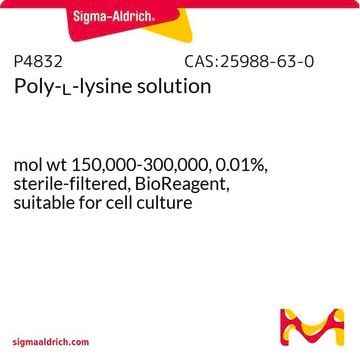P1399
Poly-L-lysine hydrobromide
suitable for cell culture, Mol wt 150,000-300,000
About This Item
Recommended Products
product name
Poly-L-lysine hydrobromide, mol wt 150,000-300,000
form
solid
Quality Level
mol wt
150,000-300,000
technique(s)
cell culture | mammalian: suitable
impurities
<10% water (Karl Fischer)
color
white to off-white
solubility
water: 50 mg/mL, clear to slightly hazy, colorless to faintly yellow or pink
functional group
amine
carboxylic acid
storage temp.
−20°C
SMILES string
Cl.NCCCCC(N)C(O)=O
InChI
1S/C18H38N6O4/c19-10-4-1-7-13(22)16(25)23-14(8-2-5-11-20)17(26)24-15(18(27)28)9-3-6-12-21/h13-15H,1-12,19-22H2,(H,23,25)(H,24,26)(H,27,28)/t13-,14-,15-/m0/s1
InChI key
WBSCNDJQPKSPII-KKUMJFAQSA-N
Looking for similar products? Visit Product Comparison Guide
General description
Application
Biochem/physiol Actions
Features and Benefits
- Suitable for Cell Culture and Biochemical research
- High-quality compound suitable for multiple research applications
Components
Caution
Preparation Note
Analysis Note
Other Notes
comparable product
Storage Class Code
11 - Combustible Solids
WGK
WGK 3
Flash Point(F)
Not applicable
Flash Point(C)
Not applicable
Personal Protective Equipment
Certificates of Analysis (COA)
Search for Certificates of Analysis (COA) by entering the products Lot/Batch Number. Lot and Batch Numbers can be found on a product’s label following the words ‘Lot’ or ‘Batch’.
Already Own This Product?
Find documentation for the products that you have recently purchased in the Document Library.
Customers Also Viewed
Articles
Kanjiro Miyata (The University of Tokyo, Japan) provides insights on the rational design of polymeric materials for “smart” oligonucleotide delivery.
Humankind has utilized protein materials throughout its existence, starting with the use of materials such as wool and silk for warmth and protection from the elements and continuing with the use of recombinant DNA techniques to synthesize proteins with unique and useful properties.
Our team of scientists has experience in all areas of research including Life Science, Material Science, Chemical Synthesis, Chromatography, Analytical and many others.
Contact Technical Service




